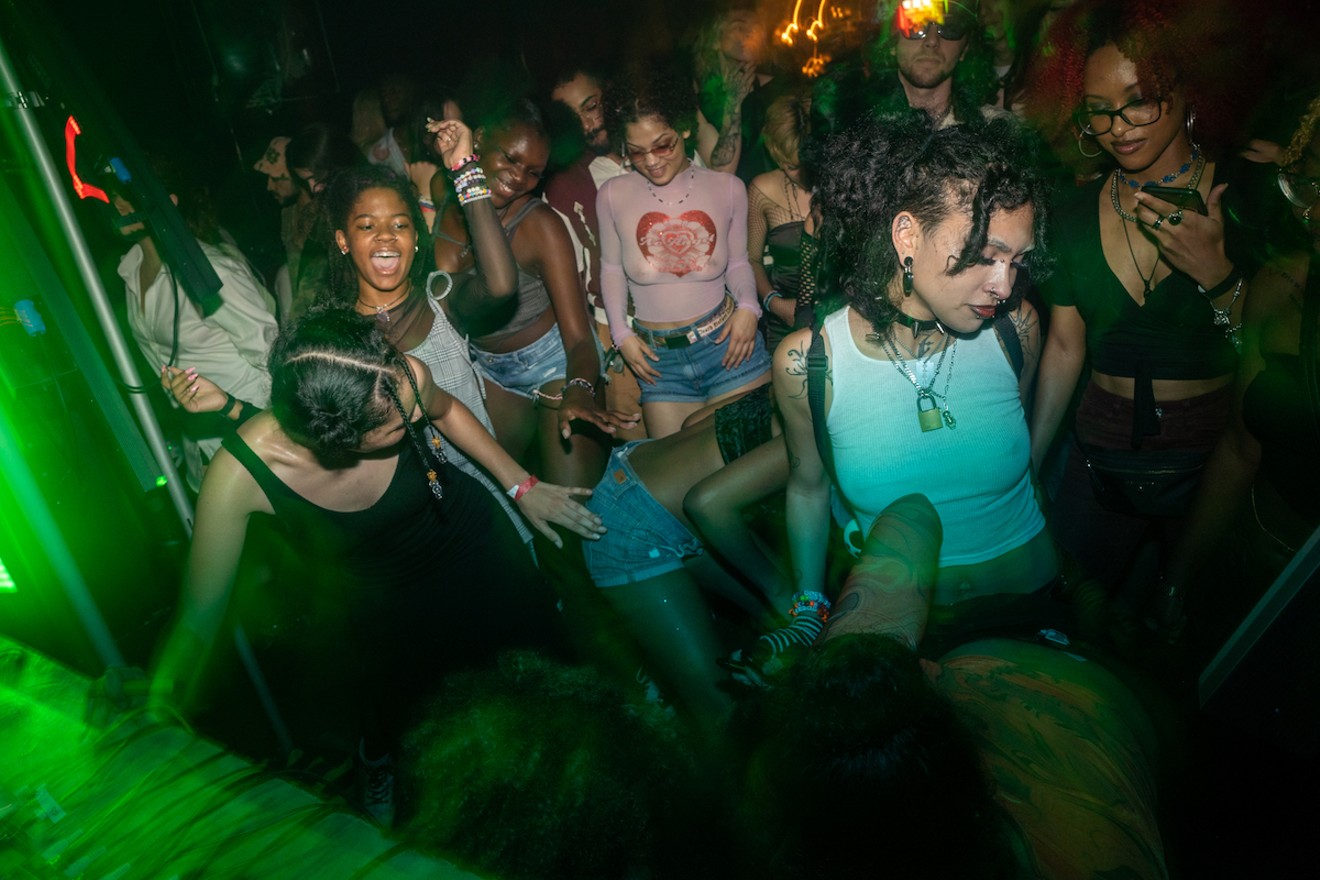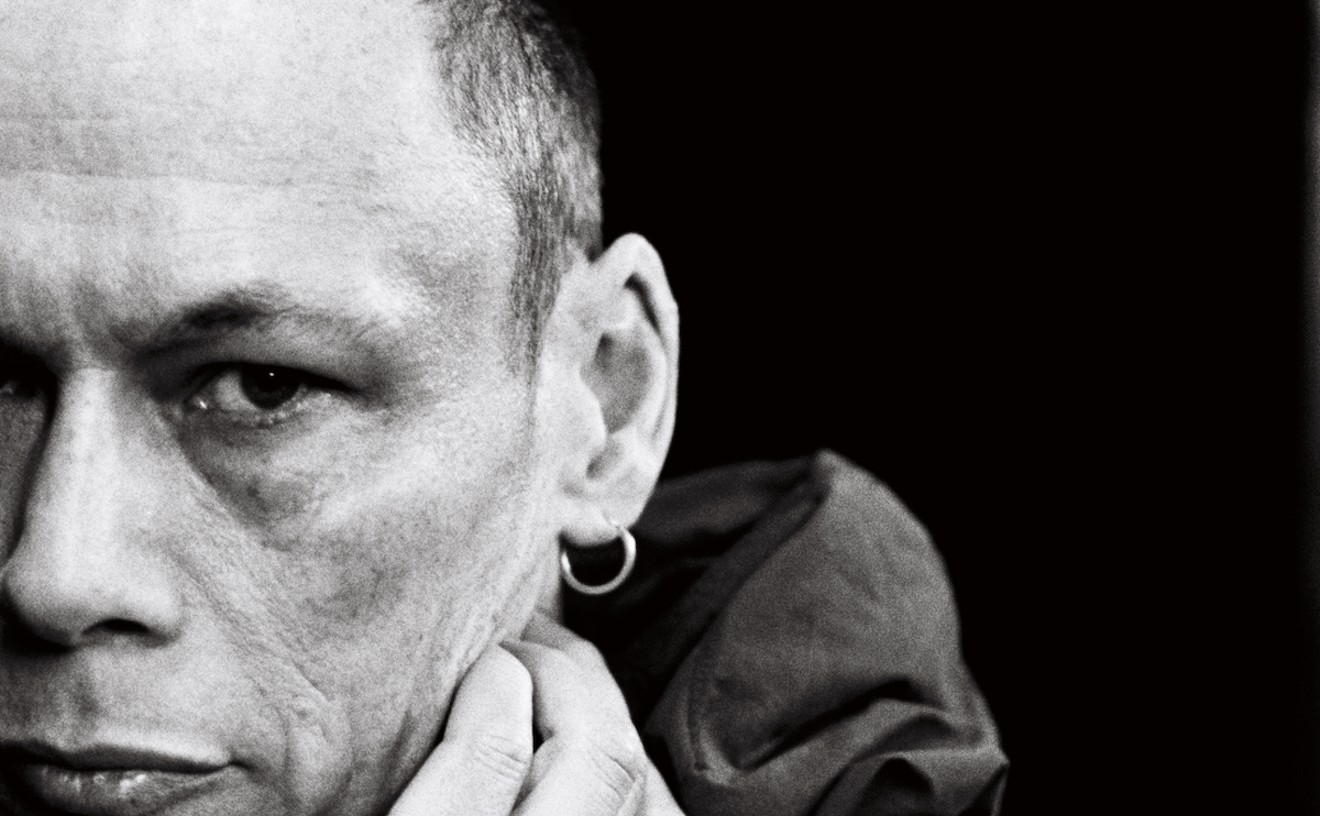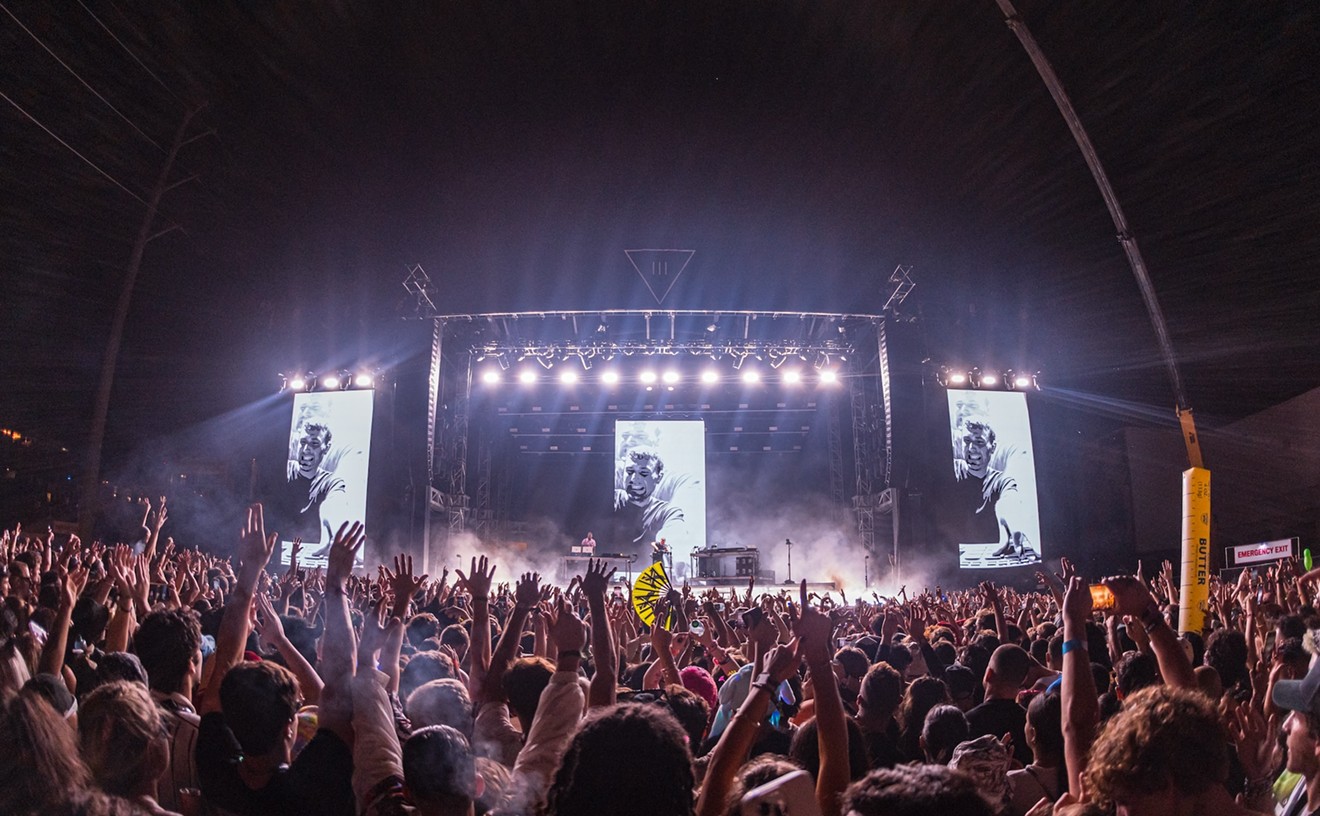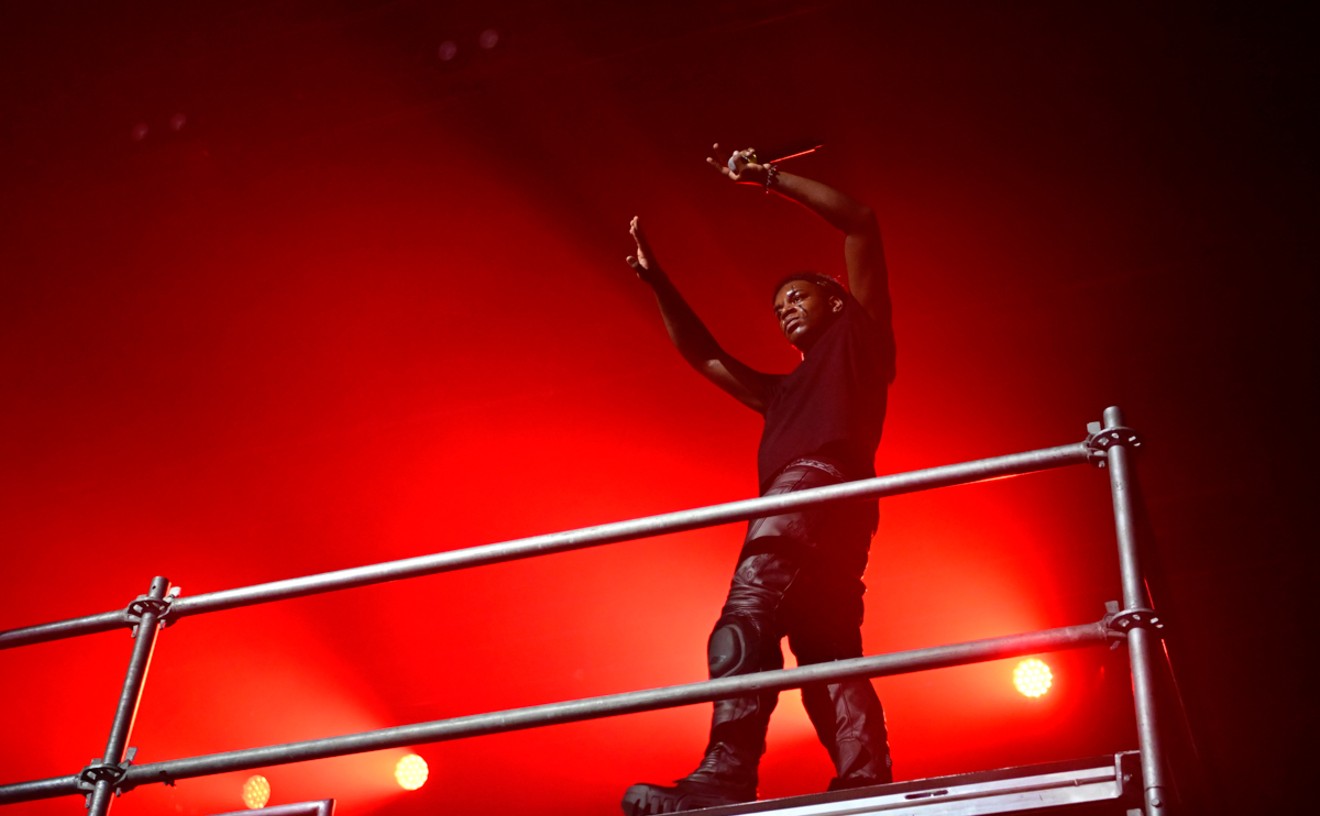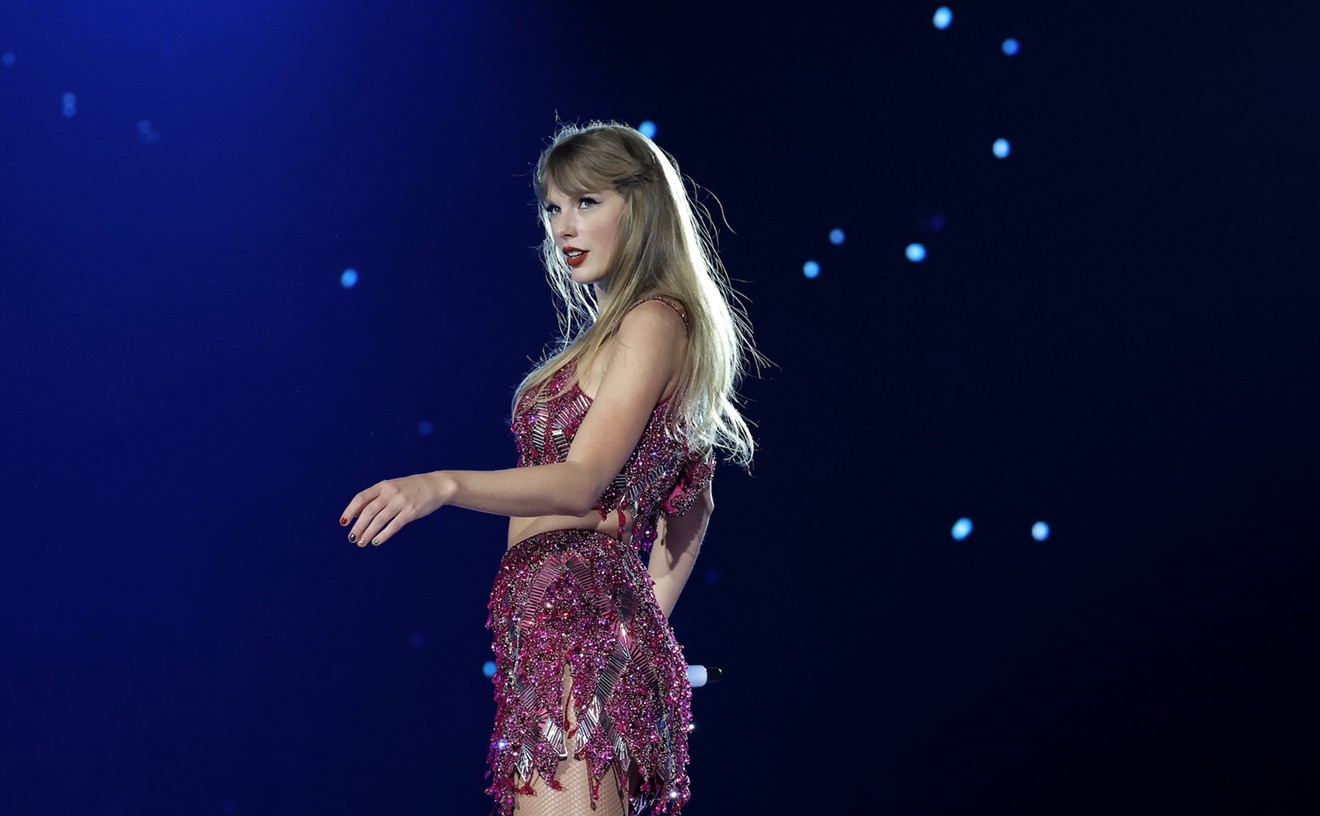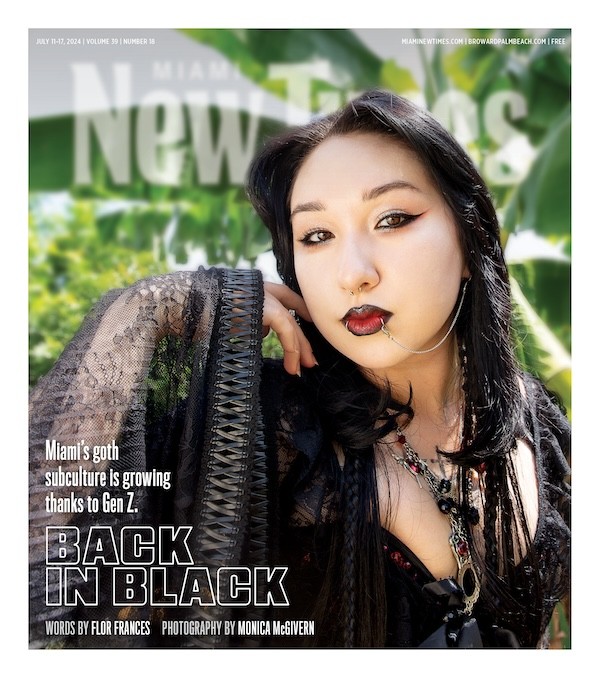In past years, DJs like Mauricio, the Invisible, and Nick Léon, and parties like Perreo del Futuro and Proibidæ have been on the frontlines of the city's underground scene, lending themselves toward a resurgence of Latin sounds that cannot be ignored. Priscilla Cavalcante, who goes by House of Pris and is the founder of Proibidæ, sees this resurgence as evidence of the growing power of Latin music genres worldwide.
Cavalcante, born in Fortaleza, Brazil, moved to Miami five years ago. Before that, she spent 20 years living in Amsterdam, a decision she made due to her musical interests.
"I fell in love with the city, and that was in 2001," she says.
She spent her time working as an event organizer and for music festivals until she realized two decades had passed. Despite her best efforts, there wasn't as much interest in the baile funk Cavalcante wanted to play in Europe. Local audiences complained they couldn't understand the Portuguese lyrics or attempted to intellectualize the music too much.
"[It] was time to experience the U.S. and come to Miami," Cavalcante adds.
The move made perfect sense for the seasoned DJ, researcher, and record label owner. Moving to the Magic City meant coming to the birthplace of Miami bass and freestyle. Both genres came to prominence in the '80s and early '90s.
Miami bass is an upbeat subgenre of electro and hip-hop characterized in part by the widespread use of the Rolland TR-808 bass machine — and a booming car culture to go with it. Pioneering artists of the genre include producer Amos Larkins II and groups like 2 Live Crew and the more commercially successful L'Trimm and Tag Team. On the other hand, the freestyle genre got its name from the Miami-based band Freestyle Express. It was a movement primarily of electronic dance music rooted in Latin communities. Big names in the genre included Company B and Pretty Tony, a member of the genre's namesake band. Along with Brazilian baile funk, these were the genres that Cavalcante highlighted as integral to her ongoing musical research.
Crucially, both Miami bass and freestyle were influenced by and came from Miami's historically Black communities, as well as Dominican, Cuban, and Brazilian cultures more broadly. Baile funk, similarly, comes mainly from Black communities in Rio de Janeiro that blend funk with Miami bass and other hip-hop subgenres.
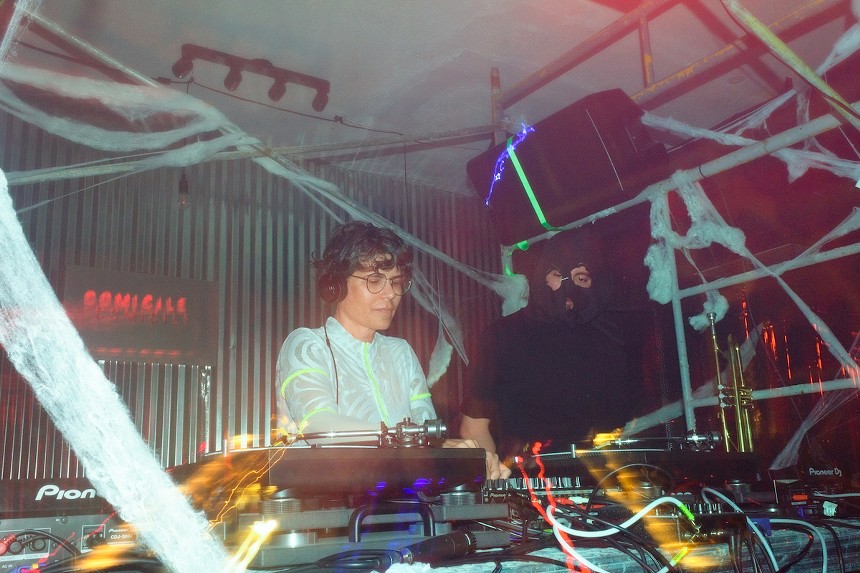
Priscilla Cavalcante (AKA House of Pris) founded Proibidæ after moving to Miami five years ago.
Photo by Betty McGhee
Formative Years
In 1993, right at baile funk's peak in Brazil, Cavalcante was only 13 years old and living near the favelas where the sound was developing. At a local warehouse party, she first heard Freestyle's "It's Automatic," and a new world of music was opened to her."At that point, I knew this is what I was gonna do with my life," she says of the moment. That party and "It's Automatic" — which she admits still makes her emotional — led her to pursue a career as a DJ.
Three decades later, baile funk, freestyle, and other Latin-inspired genres again dominate dance floors across Miami. It's also opened the doors for more Latin artists to play the kind of music that directly connects them to their experiences growing up in the city and across Latin America.
"We're really seeing a lot of Latin-influenced music, and we're really kind of like taking off because of that because Miami is such a melting pot of all these different cultures," says Pia Isabella Palomino, who DJs under the name Bunni. Even though Miami's sound is ever-changing, Palomino says it's "always giving a nod to the roots."
Palomino started DJing in 2019, right at a time when the reinvigorated underground scene in Miami was just getting started, making it easy for newcomers to get a leg in. When the pandemic hit, Palomino took the time to learn how to produce music and began to release her own original work.
She is adamant that her sound cannot be reduced to a single genre or set of inspirations. For example, Tender, her latest EP, is much more influenced by pop than her past work, which was more firmly rooted in club music. Still, she does see Latin influences in her work, especially in her DJ sets, where the goal is to connect with audiences.Even though Miami's sound is ever-changing, Palomino says it's "always giving a nod to the roots."
tweet this
Born in Miami but with parents from Ecuador and Colombia, Palomino incorporates Latin music into her sets — especially the old-school reggaeton that her peers were "grinding to during middle school" — to connect with her heritage. "I was a first-generation immigrant, so it really is important for me to be able to connect through that sound in a way that I wasn't able to because I didn't grow up in South America," she adds.
She's not the only one doing this kind of community-affirming work, either. "We all have either a memory of a party or like middle school dances or high school dances, and so seeing [other DJs] take on this nostalgia is really fun and exciting," Palomino explains.
An Underground Movement
Palomino often spins at Proibidæ events as one of the many DJs the group books for its baile funk parties, working closely with Cavalcante and Proibidæ's coproducer Stephanie Rodrigues. An emerging DJ in her own right, Rodrigues helps execute the parties from conception to when the last guest leaves. Everything is considered when planning a Proibidæ event, from the flyers and the stage lighting to booking the artists and getting them to and from the venue. Usually, that venue is Domicile, a hub for underground music in Little Haiti, where Proibidæ has a residency.Though she's been involved in Proibidæ since the group's first event, it was only around the time of the third party in March of 2022 that Rodrigues started to help Cavalcante more with artist curation and bookings, day-of tasks, and Concreta Sala, Cavalcante's indie record label, music lab, and artist management project.
For Rodrigues, who is Brazilian and sees baile funk as something that has always been a part of her life, finding a welcoming and inclusive space to engage with the genre was critical. Though she often frequented baile funk and Brazilian parties while growing up in Broward County, Proibidæ offered a new take on the familiar format.
"I would go all the time," Rodrigues says of the Brazilian parties in Broward, "but it's not the same. Even though they play the same sound up there, it's all Brazilian, so the crowd is different. There's older men, there's more girls in heels." Proibidæ, on the other hand, by being part of the underground, is an open space accepting of everyone."Baile funk has always been part of who I am as a person growing up."
tweet this
Rodrigues cites a more significant queer presence and the intimacy of the underground scene as major factors in creating this welcoming space that Proibidæ fosters. In a city where there have been historically few places for baile funk music, despite Miami's sizeable Brazilian population, Proibidæ's mission becomes all the more important for fans and artists like Rodrigues.
"Baile funk has always been part of who I am as a person growing up, just because I'm Brazilian and baile funk is in our culture," Rodrigues says. "It's kinda like, how can somebody be Hispanic and not know what reggaeton is?"
That's the beauty of Proibidæ, too. Palomino cites Cavalcante and Proibidæ as primarily responsible for bringing baile to Miami. Indeed, when Rodrigues and Cavalcante plan the next event in Proibidæ's repertoire, the most important thing is often booking artists with experience in or willingness to truly learn, research, and play baile funk. "We don't book anyone based on their clout. We don't book anyone based on their popularity. Our bookings are strictly based on the sounds that this artist brings to the table or the capacity that this artist has to incorporate the sounds we want to present," Cavalcante explains.
This commitment to the genre is, in many ways, what sets Proibidæ apart from the other, more mainstream baile funk-inspired parties that have cropped up in the city. For example, the popular Baile da Gringa party focuses on EDM edits on top of baile funk. "At Proibidæ, you can hear all kinds of baile funk, and people who are preparing to play a set of baile funk do their research," Rodrigues notes.
Palomino didn't start playing baile funk or incorporating it into her sets until she began spinning at Proibidæ's events.
"I'm not Brazilian, and I didn't grow up with that culture, but once I went to [Proibidæ's] parties, and I started listening to [baile funk], and I realized how fun it is. I became obsessed with this genre," Palomino says. "Had I not been to [Cavalcante's] parties or had she not been representing her country, maybe I wouldn't have been exposed to it. Now, I'm able to learn about it through her and through her parties and am able to incorporate that sound in my set because it's really influential to me."
These underground music spaces, like Proibidæ or Saturnsarii's iconic Perreo del Futuro, are essential community spaces where Latin artists and fans can connect with Latin-inspired sounds. As Palomino said about Proibidæ, the commitment to uplifting Latin American music — in this case, baile funk from Brazil — is similar to "traveling somewhere without going there."
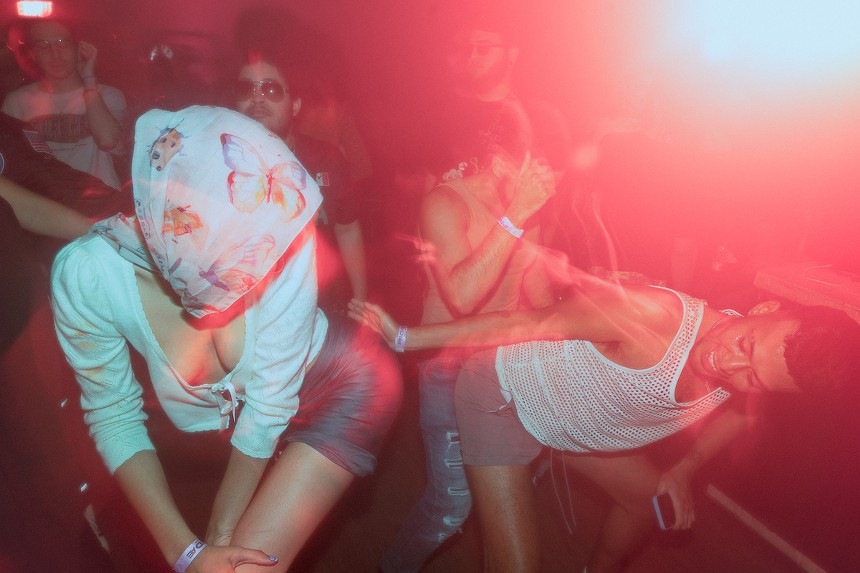
Unlike most Latin-music-focused events, Proibidæ champions a safe space with women-identifying and queer patrons.
Photo by Betty McGhee
Fostering Connections
The flourishing renaissance of Latin-inspired dance music in Miami's underground scene also has strengths beyond baile funk. For immigrants and the children of immigrants in the city, having access to a vibrant Latin music scene serves as a way to maintain ties to their heritage despite being physically away from their home countries. This is especially true for those who cannot return to their home countries for one reason or another."I have a lot of friends who are Venezuelan, and they have a new sound that's coming out [there], and a lot of them, unfortunately, don't even get to go back and visit," Palomino says. "It's really special that they get to express it here [in Miami]."
This ability to connect with countless different cultures, identities, and experiences of immigration is what makes Miami's underground unique and necessary. "If we go to another city in the U.S., I don't think we would feel that connected to our like Latin American heritage, and that's why Miami is so special," Palomino adds.
In this way, Proibidæ becomes a mirror for Miami and the need for dynamic, diverse music spaces. "Proibidæ is that meeting in the middle," Rodrigues says. "Cultural music and techno and bass and electro with the baile funk and some other Hispanic sounds as well." Above all, it's a community that provides people with a space to dance and enjoy themselves.
Earlier this month, Palomino made the difficult decision to leave Miami for New York City, hoping to "bring the Miami sound" while continuing to build her musical repertoire and hone her relationship with her art. Though sad to leave a scene that has welcomed her with open arms, she acknowledged it's "important to take that sound and everything Miami represents and take it somewhere else, [as an] even bigger way of expanding it." As an artist, Palomino's priority has always been to "put Miami on the map."
As for Rodrigues, Cavalcante, and the rest of the Proibidæ team, the future is bright. In just a few short years, the party has grown from a project spearheaded by Cavalcante to give a unique space for baile funk in the city to a national and even international hub for baile funk artists and fans alike.

